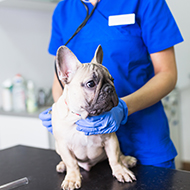French bulldog no longer 'typical dog', says RVC study

"Social media and celebrity influence have really propelled the popularity of French bulldogs in recent years, but sadly, their 'cute' features can mask a whole host of health issues" - Justine Shotton, BVA president.
A new study from the Royal Veterinary College (RVC) has revealed that French bulldogs can no longer be considered a 'typical dog' from a health perspective.
Published in Canine Medicine and Genetics, 'French Bulldogs differ to other dogs in the UK in propensity for many common disorders: a VetCompass study' reveals an urgent need for intervention to reduce the alarmingly high rate of health issues that the breed experiences.
Led by the VetCompass programme, the study compared the health of random samples of 2,781 French bulldogs, and 21,850 non-French bulldogs.
Researchers compiled a list of the 43 most common disorders shared across both groups of dogs, and discovered that French bulldogs have a higher risk of 20 out of the 43 disorders (46.5 per cent), and a lower risk of 11. Of the disorders, stenotic nares has the highest risk in the breed, which is 42 times more likely to have the condition.
The breed was also 30.9 times more likely to have Brachycephalic Obstructive Airway Syndrome (BOAS), 14.4 times more likely to suffer from ear discharge. 11.2 times more likely to have skin fold dermatitis, and 9.1 times more likely to experience difficulty giving birth.
Bill Lambert, Health, Welfare and Breeder Services Executive at The Kennel Club discussed the research: “We want to ensure that all French Bulldogs are bred with their health and welfare as the absolute priority.
“This important paper, supported by The Kennel Club Charitable Trust, enables us to understand more about the breed’s complex health concerns and can help us and those concerned with the breed to develop evidence-based tools that support responsible breeders in protecting and improving French Bulldog health.
“We, alongside vets, welfare organisations and breed clubs, continue to work collaboratively to educate the general public, many of whom simply don’t seem to be aware of the potential health and welfare issues that some of these dogs face.
“We aim to curb the increasing numbers of rogue breeders from filling the demand for these dogs – including some imported from overseas – with no regard for health and welfare.
“We urge would-be owners and breeders to think carefully about any breeding or buying decisions when it comes to French Bulldogs, and make use of health testing, evidence-based resources and expert advice.”
Lead author of the paper, Dr Dan O'Neill, is encouraging the public to think before buying a brachycephalic dog: “There is no doubting that many humans love the feeling of owning their special French Bulldog. But sadly, this study helps us to grasp the full extent of the serious health issues affecting these dogs.
“Especially in the lead-up to Christmas, we should give dogs a special present by putting the needs of the dog before the desires of the human. ‘Stop and think before buying a flat-face dog’.”



 The latest
The latest